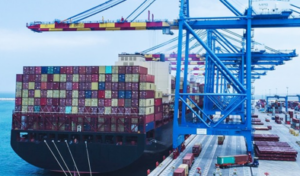By Buertey Francis BORYOR
Mr. Numbu Issahaque Sumabe, a Senior Maritime Officer at the Ghana Mahritime Authority (GMA), has stated that the country is working to become a green bunkering hub by developing infrastructure for cleaner ship energy.
He explained that the country is setting up systems to allow ships to use renewable energy sources while docked at its ports.
This move aims to reduce emissions from ships and make the ports more environmentally friendly, and forms part of a broader strategy to align with global efforts to combat climate change and promote sustainable shipping practices, he added.
“We are working towards making Ghana a green bunkering hub. This means that when vessels call at the ports, they will have access to cleaner fuels and the infrastructure to plug into renewable energy sources, such as shore power while at port. This will significantly cut down GHG emissions, other pollutants and improve air quality around port communities,” he elaborated.
Mr. Sumabe made these remarks during an interview on Eye on Port, a programme focused on maritime development and port operations in Ghana.
Bunkering refers to the process of supplying fuel to ships for their voyages. By transitioning to green bunkering, the country aims to provide alternative, environmentally friendly fuels to vessels, reducing the shipping industry’s reliance on traditional fossil fuels. This shift is expected to enhance its position as a key player in the global maritime sector while contributing to the fight against climate change.
He further highlighted that the transition to cleaner energy will create economic opportunities. “We are not only reducing emissions, but we are also looking at producing alternative fuels in a way that benefits our economy. This plan could attract investment and create jobs in the energy and maritime industries,” he said.
In addition to this he said GMA is focusing on capacity building for maritime workers. In line with this he noted that seafarers and port workers will receive training to handle new, cleaner fuels safely and efficiently.
“The transition to green fuels will require new skills and knowledge. We are committed to ensuring that our maritime workforce is well prepared to handle these changes.
These fuels may contain hazardous substances, so we need to train our workers to manage them safely,” Mr. Sumabe stated.
Moreover, he stressed the need for collaboration between different sectors to make this transition possible. “The energy sector has a major role to play in producing and supplying alternative fuels. We need a clear roadmap to guide our fuel production and long-term strategies to achieve net-zero emissions by 2050. We must also conduct studies to determine the best types of alternative fuels that we can produce,” he said.

He also highlighted efficiency at ports as another priority. “We need to ensure that ships spend less time docked at our ports. If we can reduce waiting times, we can also cut emissions. Just-in-time operations will help make the port system more efficient and environmentally friendly.










